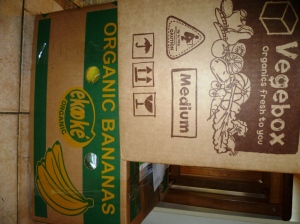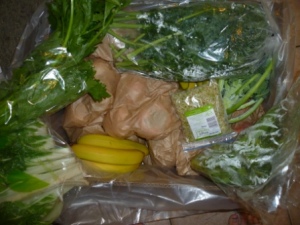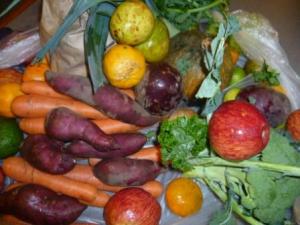Pesticides and toxic chemicals have been linked to serious health problems, and we can find them in our foods and environment – tasty, ha?
Organic produce is grown without the aid of these chemicals. They are grown with farming practices that encourage soil and water conservation and work best with the environment rather than against it. Organic grown and processed produce doesn’t have chemicals added at any point. None of it is GM either.
I know I’d rather be eating my apples knowing I was doing my body a favour rather than poisoning it!
What I find particularly scary is that we don’t really know the long-term effects of these chemicals on both our bodies and the environment, they simply haven’t been around long enough.
SO I forgave my grandmother when she told me she ‘didn’t believe in organics’ because simply, she didn’t have to think about them, let alone believe in them, in her time.
Just those few short years/generations ago, families grew a lot of their own produce by organic and natural standards – the ‘NORMAL’ way of growing fruit and vegetables by working with the environment rather than against it.
Things are different now. Crops are about making money, not providing nutrition for your body. The businesses who grow your food use chemicals to ensure that crops are not wiped out by bugs and diseases, because obviously it would be devastating for their profit if that were to happen. They can also use chemicals to encourage growth and ensure their produce looks the best, because a perfectly round large apple is more appetizing on the shelf! Finally, after your produce is harvested, it can have chemicals added – waxes to ensure it looks shiny, products to ensure it stays fresh for longer, and fumigation chemicals if its imported. Yum.
So these chemicals are doing all sorts of strange things to our bodies. Consider food allergies, memory loss & cognitive function, cancer, infertility, Parkinson’s & Alzheimer’s diseases. They are detected in unborn babies as well, and can cause birth defects. These chemicals can disrupt our hormones and cause brain toxicity. There is research that states children are especially susceptible to the effects of pesticide toxicity which in turn caused cancers and behaviorial problems.
Check out this article I was reading yesterday, about a new chemical called Cyantraniliprole, which is an insecticide. (http://www.rodalenews.com/cyantraniliprole). You can also read about the effect of pesticides here as well (http://www.davidsuzuki.org/publications/reports/2006/pesticide-use-in-canada/). These are not NZ articles. Some of the chemicals mentioned are not allowed in NZ. Some we are not affected by. But some we are. And its in our world, none-the-less, so even if our fruit isn’t tainted, our beautiful Earth is, and I think we should care about that.
What can one do? Minimize chemicals by either growing ourselves, or buying organic. Residues of harmful chemicals such as insecticides and pesticides are detected in some fresh produce more than others, so the Environmental Working Group has come up with two lists – one with foods that have the highest traces of chemicals, and their ‘clean’ list. Buying organic often comes down to price, since most of the time its more expensive to buy the organic, you can use the EWG’s lists to choose where to put your precious cash – buy organic produce that is on the ‘dirty’ list, and worry less about organic for the clean list.
EWG’s Dirty Dozen™ list of produce includes apples, strawberries, grapes, celery, peaches, spinach, sweet bell peppers, imported nectarines, cucumbers, cherry tomatoes, imported snap peas and potatoes. Each of these foods contained a number of different pesticide residues and showed high concentrations of pesticides relative to other produce items.
In particular:
- Every sample of imported nectarines and 99 percent of apple samples tested positive for at least one pesticide residue.
- The average potato had more pesticides by weight than any other food.
- A single grape sample contained 15 pesticides. Single samples of celery, cherry tomatoes, imported snap peas and strawberries showed 13 different pesticides apiece.
The lists are:
The Dirty Dozen (in order of contamination)
Apples
Celery
Sweet bell peppers
Peaches
Strawberries
Nectarines
Grapes
Spinach
Lettuce
Cucumbers
Blueberries
Potatoes
The Clean 15 (in order of least contamination)
Onions
Sweet Corn
Pineapples
Avocado
Cabbage
Sweet peas
Asparagus
Mangoes
Eggplant
Kiwi
Cantaloupe
Sweet potatoes
Grapefruit
Watermelon
Mushrooms
Everything I’ve read points to saying that eating fresh fruit and vege, even non-organic, is far far better than eating processed food. So that may need to be your first step, is increasing the amount of fresh produce in your diet. If $$ are tight, head to your local farmers market!!! Once you’ve increased how much you are eating (and the kids don’t gag at the sight of broccoli 😛 ) then it might be easier to look at organic options. Over to you, of course!!
I’ve done the markets, our local green grocer, and our supermarket. I sometimes grow my own, and I delight in the excess produce gifted to me by family, friends and neighbours.
What really excites me though is my delivery boxes – fresh organic produce delivered to my door. I dont live in a large place where I can easily access these veges, particularly not organic. Deliveries are also very exciting 😛
I trialled two places recently. I bought a medium box from VegeBox.co.nz, and a large family mixed box from Naturally Organic. The following week I bought a large box from VegeBox.co.nz.
The benefit of Naturally Organic is that you can order extra products at the same time. I found their produce was individually wrapped and they offered more variety such as sprouts and celery. Everything was fresh and it was a nice box. I’d definitely recommend to a family!
I like the Vegebox mixed box, I had a muck-up with my order and they were super fast to remedy it with no problems. Everything was very very fresh and great amounts. Less variety but I felt everything was awesome quality.
I would highly reccomend you try a couple to get a feel for the size you want and the company you prefer, because they are all different. I’d also review your decision in Summer/Winter each year to see what others are offering and to ensure the needs of your family are being met.
Based on what I have tried, I feel the boxes are excellent value for money (even though I have to pay $20 for postage, so if you pay less then even better value for you!). You get a great variety and I love trying new foods and getting more comfortable with choko, kale and artichokes etc. My favourite new vege is celeriac – something I would never have tried without the boxes.
Nationwide:
http://www.naturallyorganic.co.nz/
Christchurch and South Island: www.justorganic.co.nz/
Selected South Island: http://www.fresh2u.co.nz/
Auckland: http://www.produceexpress.net.nz/
Auckland: http://www.thehonestybox.co.nz/
Auckland: http://www.vegdout.co.nz/
North Island: Free delivery: http://organicboxes.co.nz/
North Island: http://www.organicconnection.co.nz/
Selected Cities http://www.producedelivered.co.nz/
Selected Citites (Not organic): https://foodbox.co.nz/





One thought on “NL: Vege’d Out – Why choose organic and where to buy it”